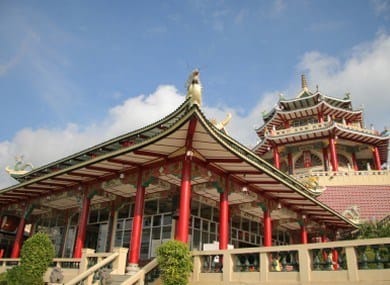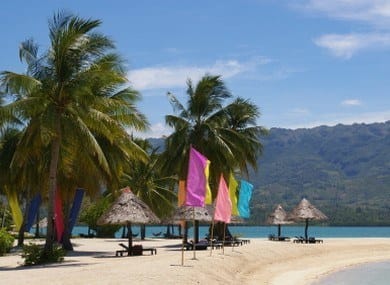We offer a world-renowned TEFL / TESOL certification course in Cebu, Philippines that prepares you for teaching English overseas, or in your home country. Our TEFL certification courses last for four weeks and have a very practical emphasis. There is no need to speak any language other than English, as our courses concentrate on training you to teach English with the international standard communicative approach – where English is the only language used in the classroom.
This is the most practical and fundamental area of any TEFL training course. During the teaching practice sessions, trainees have the opportunity to teach real students of English and put into practice the skills learnt during the theoretical parts of the course.
2) Foreign Language Experience
During the course, trainees receive instruction in an unknown foreign language to help them reflect on the experience of being a learner. This session is extremely useful in creating empathy between the teacher and student and should help trainees to direct their own teaching.
3) Language Awareness
a) This area focuses on grammar and covers subjects such as parts of speech, the structure of tenses, conditionals and modals and other common grammar points. During these sessions trainees learn about these subjects as well as ways to teach them to their future students in the classroom.
b) This area also looks at the subject of phonology and covers phonemics, word and sentence stress, intonation and connected speech.
4) Student Profile
For this part of the course, each trainee is required to work with an individual student in order to work on things such as rapport building, error analysis, correction techniques and addressing individual student needs. Three meetings with the student are required to complete the profile, after which the trainee completes a one-to-one lesson with their student. The final stage is the completion of a written report regarding the lesson.
5) Teaching Techniques
This component of the course covers areas such as:
- Lesson planning
- Classroom management
- Establishing rapport
- Discipline in the classroom
- Managing equipment and teaching aids
- Creating materials
- Correction techniques
- Evaluation and testing
- Teaching vocabulary
- Teaching grammar
- Teaching receptive skills (reading and listening)
- Teaching productive skills (speaking and writing)
- Games in the classroom
- Songs in the classroom
- Teaching beginner students
- Teaching individual students
6) Materials Project
All trainees are required to create their own set of materials to be used during the teaching practice. These materials will be useful in future teaching environments and will help to instill the benefits of creativity and resourcefulness in relation to your lesson planning. The materials should be easily portable, durable and adaptable for different lesson points.
Once you have created your materials project you will present it to a course trainer and demonstrate how it will be used in the classroom. Your trainer will then provide advice and suggestions on how they can be improved and how they could be used in another context.
Course fees
The total price is divided into: deposit and balance.
The deposit may be paid via a) credit card b) PayPal c) wire transfer d) Western Union.
The balance of the course fee must be paid by cash, PayPal or bank transfer directly to the training center on the first day of the course.
Apply Today
All applications from candidates aged 18 (younger ages may be considered in exceptional circumstances) and above will be considered for our English teaching courses. Our in-class TEFL courses are intensive, four-week programs; however, all trainees should still have sufficient time to explore the local area, experience the culture and to meet new people. Also, individual course organizers will often arrange leisure activities for our trainees so they can socialize in their spare time and make the most of their experience.
Reviews
TEFL Cebu | TEFL Philippines
Cebu is one of the most developed provinces of the Philippines and is the main centre of commerce, trade, education and industry in the central and southern part of the archipelago. Cebu is currently a city of vast growth, but it has still managed to maintain its cultural roots making it an interesting and exciting location to take a TEFL course in the Philippines.
Cebu City, known as the ‘Queen City of the South’, has become a thriving, bustling centre that boasts an impressive array of restaurants, world-class golf courses and shopping malls. Only a few minutes away from the city you will also find numerous white sandy beaches, crystal blue waters and swaying palm trees, all of which provides a perfect destination for your TEFL course training.
Once you have successfully completed your TEFL course, we will help you find a suitable position through our lifetime job assistance program. We are able to help you find jobs you wouldn’t normally find as well as offer consultation on writing resumes and answering interview questions.
TEFL Course in Cebu
Our TEFL course centre in Cebu is comfortable, modern and air-conditioned. The centre is perfectly located and fully equipped with all the necessary teaching resources and materials and as such provides an ideal environment for studying your TEFL course in the Philippines.
Our Cebu course offers two accommodation options: the first option is a private room which is located no more than a 5-minute walk from the TEFL training centre. All of these rooms are comfortable, clean and adequately furnished for your stay. The second option is accommodation in a boutique hotel, located no more than a 10-minute drive from the training centre. The hotel rooms are spacious and comfortable and all come with air conditioning.
The course fees listed on our website are inclusive of course-related lessons, materials, teaching practice, assessments, certificates, references, lifetime job assistance and more. We have no hidden costs or extra charges so the prices you see on the site are the prices you will pay.
Getting Started
If you are at least 18 years of age and speak English fluently, you are eligible to apply for the course. The application is brief and we will send you a prompt reply. Once approved, you will receive additional information about the course content and schedule, your accommodation options, travel arrangements, as well as payment options and more.
Apply to take our TEFL course in Cebu now and soon you could be experiencing life on a tropical island. However, training there doesn’t mean you have to stay and teach in the Philippines. If you would like to move on after the course, we offer lifetime assistance finding jobs and our certificates are recognised worldwide.
The School
Our TEFL course in the Philippines is based in a comfortable, modern and air-conditioned training centre on the tropical island of Cebu. The centre is perfectly located and fully equipped with all the necessary teaching resources and materials you will require to successfully complete your TEFL course training. Extra services provided by the school include free internet access throughout the centre (you are welcome to bring your laptop along and take advantage of the centre’s wireless connection) and complimentary tea and coffee making facilities.
In the general vicinity of the training centre you will find a wide variety of restaurants, bars and top class shopping, as well as several large shopping malls and supermarkets. You will also have convenient access to the local public transport network which provides links to all the main attractions within the city and the surrounding area.
Accommodation
Once you have confirmed your place on our TEFL course in Cebu, we will send you a full list of accommodation options that are available in the surrounding area. For those who prefer not to have to travel too far each day, accommodation is conveniently provided immediately above the training center. For those who do not mind a short walk or bus trip between the center and their accommodation, there are plenty of other options to suit all budgets and preferences.
The overall cost of your stay will depend on the level of comfort and service you require; however, all our options will provide a safe, clean and welcoming environment for you to stay in. Our center has developed a good working relationship with many of the establishments that we recommend, with several providing our trainees with special discount rates. Prices start from around US$ 235 for the duration of the course.
Accomodation Fees
The accommodation fees are not part of the course price and you are free to choose whichever accommodation option you prefer.
You are not obliged to use the accommodation provided by the school and you are welcome to make your own accommodation arrangements. If you choose to use our accommodation, it should be paid for either by cash, PayPal or bank transfer directly to the school at the start of the course.
Reviews
FAQs
What are my payment options?
Course deposits must be paid to our administrative center. Credit/debit card payments are the fastest and cheapest way to pay, but we also accept payments via Western Union, Pay Pal and bank transfer. While there are no deadlines for a deposit, courses can fill up quickly and your seat will only be reserved after the deposit has been paid.
Once you make your deposit, you will receive an email with an informational packet that provides detailed information about the course and Cebu itself.
The balance of course fees is payable in cash (US dollars or Philippine peso) on the first day of class. Alternatively, you can pay via bank transfer but these payments should be made at least two weeks in advance of the course’s start date.
Course fees are all-inclusive so you won’t be asked to pay additional costs for course related materials or services. This also includes course moderation and accreditation fees, airport pick-ups* and lifetime job assistance.
* Airport pick-ups are available on the Saturday before the course begins.
What travel documents will be needed for the Philippines?
All visitors to the Philippines are required to carry a passport valid for at least six months after their arrival date. Visitors to the Philippines from the United Kingdom, USA, Australia and New Zealand can stay in the Philippines for a maximum of 60 days without a visa and this can easily be extended. Citizens from all other countries should contact their local consulate to obtain current travel regulations.*
* As this information is subject to change at any time, we advise you to contact your local consulate for current travel regulations prior to planning your trip. For more information on obtaining visas please check with your local Filipino consulate or embassy.
What is the course schedule?
The initial orientation is on Monday morning at 8:45 a.m. prior to the first class. The first class will take place on Monday morning at 9:30 a.m. The full course schedule will also be provided on Monday morning. Sessions generally run between 9:30 a.m. and 5:00 p.m. with appropriate breaks throughout the day.
What can I expect during teaching practice?
We use local Filipino students for the trainees’ teaching practice. The students are very keen and enthusiastic and because we don’t charge them to attend, all students come to classes purely because they want to!
Lessons are based upon real teaching resources found all over the world and you will have the chance to create your own materials as well. You will also receive the aid of your course trainer throughout lesson planning and receive immediate feedback on your lesson after it’s been delivered. Practicum is assessed and a satisfactory assessment is required to earn your TEFL/TESOL certificate.
Who usually attends the course?
We average around 16 trainees on each course. The majority of trainees are British or American, while many others come from Australia, New Zealand, Canada, Ireland, South Africa and the Philippines. Occasionally, we do get fluent non-native English speakers from Western Europe, Scandinavia, India, China, Thailand, etc. Trainees must be 18 years of age or older and the age range varies greatly depending on the course.
Is there a dress code?
For all input and tutorial sessions at the training location, there is only one specific dress requirement: Both men and women should have a shirt covering their shoulders. The course operates from within a school so we ask you to be mindful of this, as well as being mindful of your peers and to respect the fact that you are a visitor in another country.
During teaching practice there are specific requirements that adhere to the local dress code. All trainees are expected to dress professionally according to the following guidelines:
Women: Shoulders should be covered, blouses with sleeves are suggested. No low-cut necklines, very short skirts or bare midriffs. Open-toed shoes are acceptable, but not hiking or flip-flop sandals.
Men: Long pants, slacks or trousers are required, jeans are not acceptable. Short or long-sleeved shirts with a collar are necessary, although a tie is not required. Loafers or dress shoes are both fine, sandals are not acceptable. Long hair should always be tied back.
What should I bring for course studies?
Please be sure to arrive on the first day of the course with a notebook and a pen. We also encourage you to bring a laptop as we have Wi-Fi at the training center. We will provide all course materials for you so there is no need to bring anything else for the course itself.






